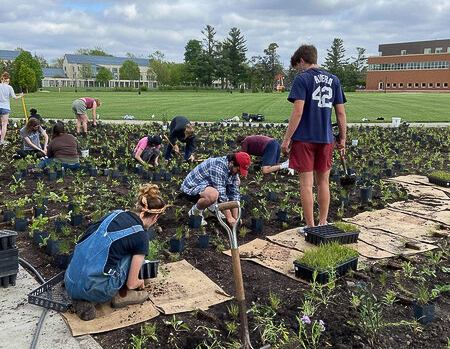UH Maui student selected as fellow in Re:wild Your Campus conservation group

As college and university students across the United States prepare for the 2022-2023 school year, Re:wild Your Campus – a new partnership of global conservation organization Re:wild and student-founded Herbicide-Free Campus – is helping them make their campuses safer and healthier for people and wildlife.
At the University of Hawai’i Maui College, student Clifford Russel was selected as one of 21 Re:wild Your Campus fellows from 11 colleges or universities.
Russell said he plans to leverage the resources, support structure and guidance this fellowship provides to open channels of communication with the campus administration, groundskeeping, and operations and maintenance departments about the current state of herbicide and pesticide usage.
He plans to collect more data and conduct controlled studies related to the use of organic herbicides, using the information as proof of concept to demonstrate the potential savings, reduced water usage and ecological benefits the college can gain from making the switch to environmentally friendly products.
Herbicide-Free Campus started in 2017 as a student-led program working to reduce and remove toxic herbicides that can cause disease and illness in humans and hurt native pollinators and other species from college and university campuses.

Re:wild Your Campus will continue this mission while expanding student volunteer programs to include supporting pollinator populations and planting native plants. Later this year Re:wild Your Campus will also launch a green grounds certification program to recognize schools that are at the forefront of the collegiate organic land care movement.
“Re:wild is the partner we have been waiting for to support us in our next chapter of growth,” said Mackenzie Feldman, project director of Re:wild Your Campus. “Eliminating herbicides is really where our work begins. There are nearly 4,000 college and university campuses in the United States — that is a significant amount of land and influence. These campuses can help promote biodiversity and climate resilience as we empower the next generation of leaders to revolutionize land care.”
Colleges and universities enroll 19 million students each year, representing a bigger population than 46 of the 50 states. Only California, Florida, New York and Texas have more residents. These institutions spend upwards of $671 billion each year, which can position them as powerful economic drivers and trailblazers in the environmental movement.
Feldman first learned about the health effects and environmental consequences of herbicides while an undergraduate student-athlete at the University of California, Berkeley. After learning that the university was using carcinogenic herbicides to keep weeds from popping up around its outdoor volleyball courts, she organized student volunteers to help manually pick weeds and met with the administration to find alternatives to herbicides to protect groundskeepers, students and the environment.
Since 2017, Feldman and Bridget Gustafson, senior advisor of fellowships, have helped more than 200 students take action for the environment. Their work is guided by organic land care practices that have been proven to save water and money, eliminate exposure to carcinogens, promote biodiversity and mitigate climate change.
Re:wild Your Campus also works to educate students on the environmental justice components of the toxins issue beyond campus life, such as that the use of pesticides and herbicides has disproportionately affected BIPOC [Black and Indigenous people of color] communities.
“As students head back to school, we are celebrating this new partnership that gives Re:wild and Re:wild Your Campus the opportunity to help more students restore and rewild their own environments on campus,” said Carrie Hutchison, Re:wild’s director of marketing and brand. “We are often asked by the public about ways we can all take action in our own lives to support the wild. This is a direct way for college students to get involved while broadening our global effort to protect and restore the wild.”
Re:wild is the fiscal sponsor for Re:wild Your Campus, which includes financial, legal, and administrative support. For more information, go to rewild.org/rewild-your-campus.




_1768613517521.webp)



